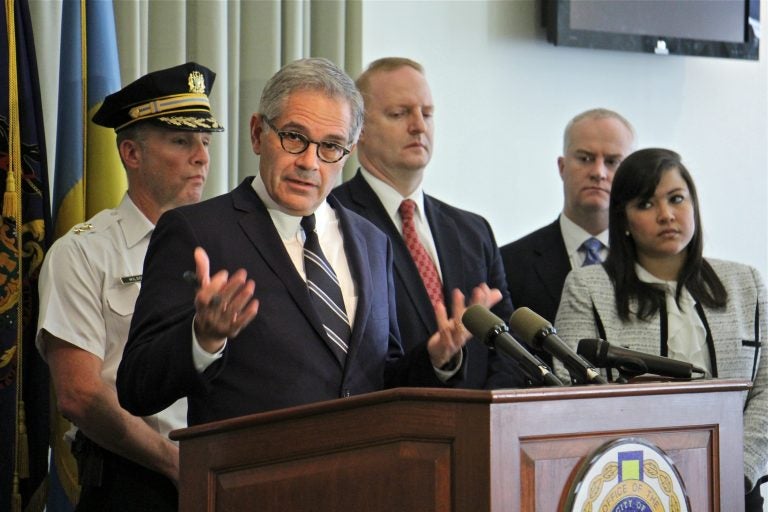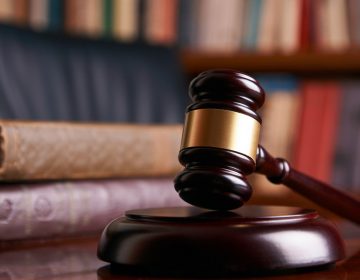Dozens charged in Kensington multimillion-dollar drug trafficking operation
The group sold drugs around eight city blocks near Kip and Cambria streets in Kensington, the heart of the city’s opioid crisis, authorities said.

Philadelphia District Attorney Larry Krasner announces criminal charges against major narcotics traffickers in Kensington in October 2018. (Emma Lee/WHYY)
A Philadelphia grand jury has unsealed criminal charges against nearly 60 people authorities have linked to a Kensington drug-trafficking group known as Alameda that allegedly sold the synthetic opioid fentanyl, heroin, cocaine, and other drugs, bringing in more than $5 million a year.
“We managed to do what is essentially a takedown of an entire organization, and we did it in nine months,” said Philadelphia District Attorney Larry Krasner during a press conference Thursday.
The group sold drugs primarily around eight city blocks near Kip and Cambria streets in Kensington, the heart of the city’s opioid crisis, and an area considered one of the most dangerous and impoverished in Philadelphia, authorities said.
Prosecutors identified the drug group’s three kingpins as German “June” Alameda, Jeremiah “Chino” Figueroa, and Orlando “Oskie” Moran.
The three are in custody, as well as 32 others suspects linked to Alameda, authorities said. Warrants have been issued for about two dozen others.
The three Almeda leaders now face nearly 700 criminal charges including corrupt organization charges, intent to deliver heroin and possession of illegal firearms, Krasner said.
As the city considers new ways to tackle the opioid-fueled overdose crisis in the city, which claimed more than 1,200 lives last year, Krasner said the epidemic’s impact on neighborhoods must be recognized. Removing dealers from the streets helps improve the lives of Kensington residents, he said.
“We have to not only think about the people suffering from addiction, not only the people who overdose, we need to think about the people who live in those neighborhoods, the kids who are in those homes,” said Krasner.
Assistant District Attorney Ryan Slaven, one of the lead prosecutors on the case, said investigators tracked drug dealers around Kip and Cambria streets for months before zeroing in on them and targeting the group’s suppliers. Every day, Slaven said, street dealers would sell up to $10,000 in narcotics in this area.
“This location has been relatively notorious to us for the past several years,” Slaven said.
Councilwoman Maria Quiñones-Sánchez, whose district includes Kensington, praised the drug bust.
“Will this solve all the problem? Absolutely not. But we have to get buy-in from the community, and this is a great first step,” she said.
Quiñones-Sánchez said she hopes dismantling the Alameda drug group will begin “to bring back the quality of life for residents trapped in what we all know has been a contained epicenter of a lot of layered problems.”
Earlier this week, former Pennsylvania Gov. Ed Rendell told WHYY that he is helping lead a newly formed nonprofit called Safehouse that’s planning what may be the country’s first supervised injection site in Kensington. The facility will allow those struggling with addiction to use their drugs under medical supervision; advocates hope those users will be nudged into treatment through the facility’s resources.
But on Thursday, Quiñones-Sánchez was skeptical such a facility will open in her district. That stance underlines the importance of winning the support of the community and its elected leaders as one of a host of thorny issues Safehouse organizers must confront as it begins fundraising.
“I am not convinced that without a full reform of continuum of care that a safe injection site will be a good toolbox,” Quiñones-Sánchez said. “I absolutely think if something is going to happen, it should be done by local people and not someone coming in and implanting themselves in Kensington.”
WHYY is your source for fact-based, in-depth journalism and information. As a nonprofit organization, we rely on financial support from readers like you. Please give today.




